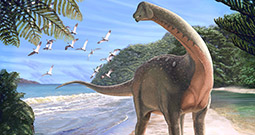New Egyptian dinosaur fossil reveals link between Africa and Europe – here's all you need to know
The dinosaur fossil was dated back to the Late Cretaceous period and has been identified as a new species.




A newly discovered fossil of a long-necked, bus-sized dinosaur, which around 80 million years ago, lived in Africa, was just discovered in the heart of the Sahara Desert in Egypt. The new discovery has palaeontologists surprised and excited, as very little is known about African dinosaurs from this period.
The dinosaur fossil was dated back to the Late Cretaceous period and has been identified as a new species — Mansourasaurus shahinae. The prehistoric creature belongs to the Titanosauria family — a group of sauropods that populated the Earth during the Cretaceous period and included some of the largest known behemoths to ever walk the Earth, such as Argentinosaurus, Dreadnoughtus and Patagotitan.
The fossil was discovered by an expedition led by Dr Hesham Sallam of the Department of Geology at Mansoura University in Mansoura, Egypt. "The discovery and extraction of Mansourasaurus was such an amazing experience for the MUVP team. It was thrilling for my students to uncover bone after bone, as each new element we recovered helped to reveal who this giant dinosaur was," Sallam said in a statement.
Palaeontologists were shocked to discover the perfectly preserved skeleton of the dinosaur, which included the skull, the lower jaw, neck and back vertebrae, ribs, most of the shoulder and forelimb, part of the hind foot and pieces of dermal plates.
"When I first saw pics of the fossils, my jaw hit the floor. This was the Holy Grail — a well-preserved dinosaur from the end of the Age of Dinosaurs in Africa — that we palaeontologists had been searching for for a long, long time," Dr Matt Lamanna of Carnegie Museum of Natural History, a co-author of the new study, said.
Dr Eric Gorscak, a postdoctoral research scientist at The Field Museum and a contributing author on the study, termed it a critical discovery for Egyptian and African palaeontology and said that Mansourasaurus shahinae is a key new dinosaur species. "Africa remains a giant question mark in terms of land-dwelling animals at the end of the Age of Dinosaurs. Mansourasaurus helps us address longstanding questions about Africa's fossil record and paleobiology—what animals were living there, and to what other species were these animals most closely related?" Gorscak added.
The dinosaur fossil also revealed a link between dinosaurs in Africa and Europe. During the Cretaceous period, the Earth looked a lot different from what it looks like today. Before the Cretaceous period, instead of broken up pieces of landmass which are present today, our planet only had one giant continent. However, it was during the Cretaceous period that the massive Pangaea supercontinent began breaking apart, sparking off a major and dramatic geological shift in the history of our planet.
Until now, scientists were still uncertain about how well-connected Africa was to Europe and whether African animals were split up from their neighbours. However, the newly discovered dinosaur fossil has helped answer some of these questions.
According to Sallam, the dinosaur is more closely related to dinosaurs in Europe and Asia than those in South America or southern Africa. "Africa's last dinosaurs weren't completely isolated, contrary to what some have proposed in the past," Gorscak said. "There were still connections to Europe."
"The discovery of rare fossils like this sauropod dinosaur helps us understand how creatures moved across continents, and gives us a greater understanding of the evolutionary history of organisms in this region," says Dena Smith, a program director in the National Science Foundation's (NSF) Division of Earth Sciences.
The NSF, along with the Mansoura University, the Jurassic Foundation, the Leakey Foundation, the National Geographic Society/Waitt Foundation, funded the new study. The research has been published in the journal Nature Ecology & Evolution.
"What's exciting is that our team is just getting started. Now that we have a group of well-trained vertebrate palaeontologists here in Egypt, with easy access to important fossil sites, we expect the pace of discovery to accelerate in the years to come," Sallam said.






















